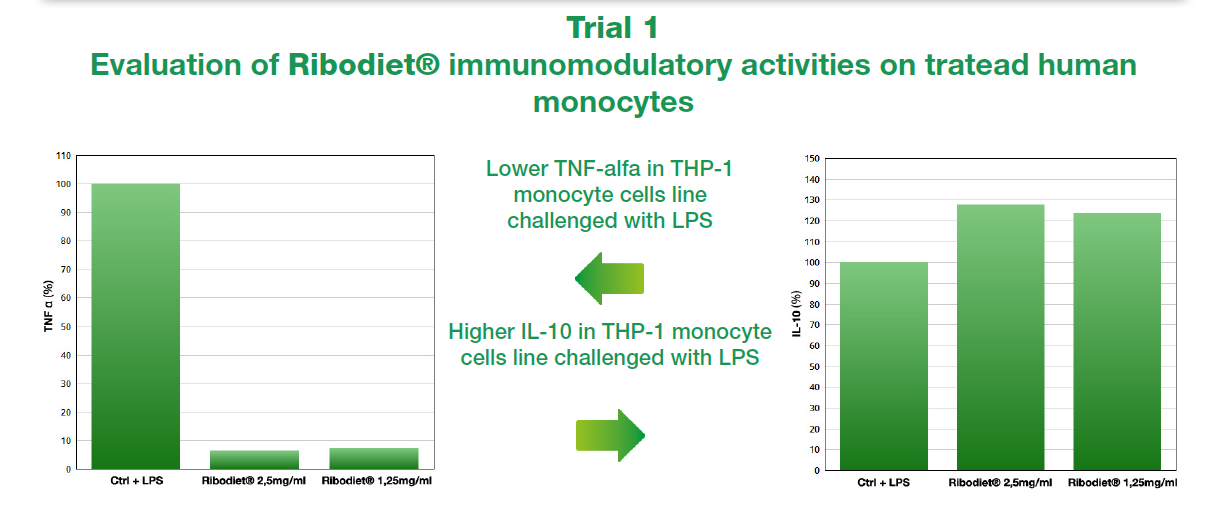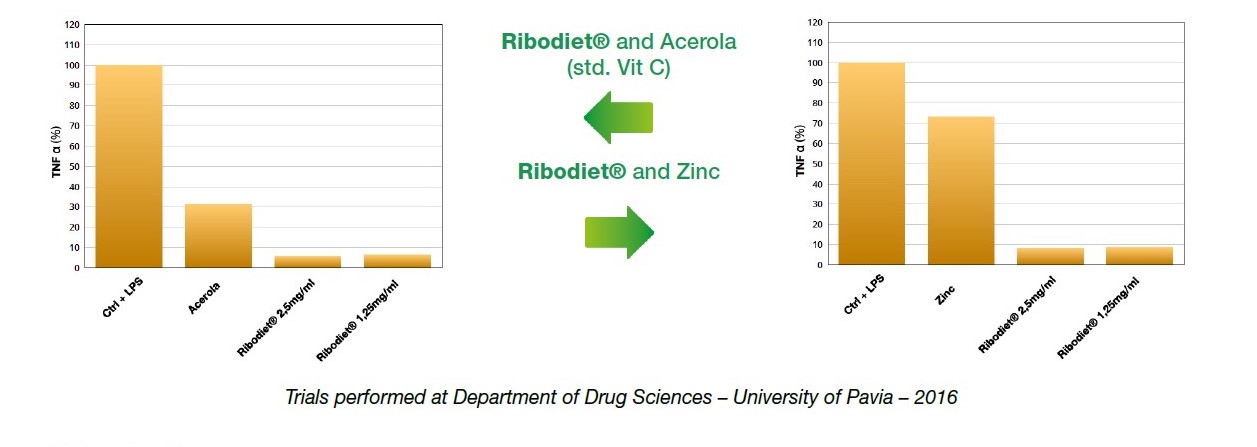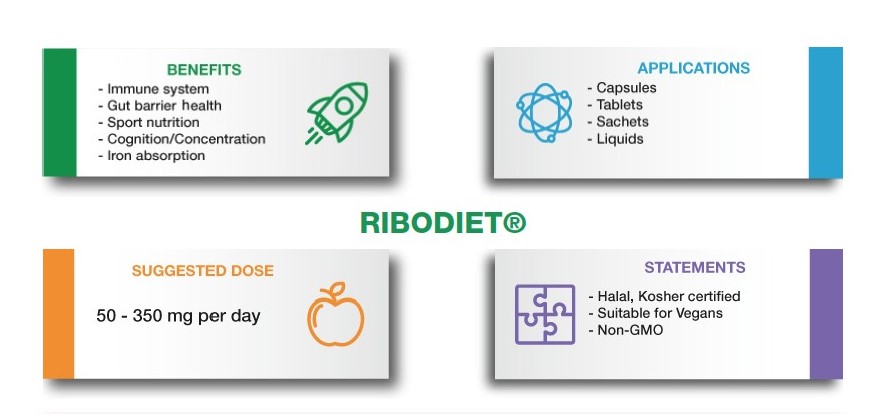Ribodiet®: boosting immunity with nucleotides
Ribodiet® is a Prosol new natural product extracted from yeast cell with standardized, highly controlled and gentle process organic solvent free.
Nucleotides have been commercially used in human infant formulas for many years, as a way of improving gastric development and early immune function. (Helembai et al., 2006; Ruihua et al., 2006).
Ribodiet® is a source of nucleotides, nucleosides, oligo nucleotides, ribonucleic acids fragments, aminoacids and vitamin B complex. All these nutrients represent a pool of active and beneficial ingredients.
Nucleotides
Nucleotides are low-molecular-weight intracellular compounds that participate in numerous biochemical processes. They consist of a nitrogenous base (pyrimidine or purine) linked to a pentose (ribose or deoxyribose) sugar to which one, two or three phosphate groups are attached. 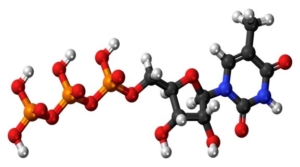
In the cell nucleotides have several functions:
– Structural: Nucleic Acids (RNA, DNA)
– Carriers: energy transport (ATP, ADP, AMP)
– Co-enzymes: key role in synthesis of proteins, fats and carbohydrates metabolism
– Messengers: intracellular signal transduction
Nucleotide-free diets have been shown to impair cell-mediated and humoral immune responses; which include decreased macrophage and natural killer (NK) cell activity, delayed type hypersensitivity responses, cytokine levels, lower antibody production, all of which may lead to an increased susceptibility to infection (Gil, 2002; Sanchez-Pozo and Gil, 2002). These changes can be reversed by supplementation with nucleotides (Gil, 2002; Navarro et al., 1996).
About Ribodiet®
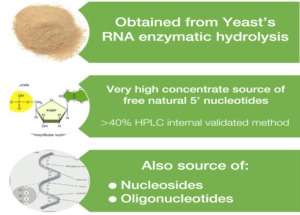
About Ribodiet®
How benefit from nucleotide use
De novo synthesis does not satisfy the nucleotides requirements of many tissues and particular life physiological phases, making necessary a reinforcement by dietary source.
Particularly, some cells at high turn-over rate, such as gut, immune system and cerebral ones (lymphocytes, erythrocytes, bone marrow cells; glial cells) are not able to produce enough nucleotides to cover their needs
Scientific Evidences
There is increasing evidence that dietary nucleotides may affect different aspects of body function and health in single-stomached animals, including:
- intestinal morphology and function
- immune response
- composition of the intestinal microbiota
- liver function and morphology
Ribodiet® in vitro TRIALS
Conclusions
After treatment with Ribodiet® and LPS stimulation all the results, assessed to be statistically significant, indicate that Ribodiet® showed those in vitro effects:
- anti- inflammatory
- immune- modulatory
RIBODIET® Trial 2. Evaluation of anti-inflammatory activity of Ribodiet® in combination with other ingredients on treated human monocytes
Conclusions
After treatment with Ribodiet® in combination with Acerola (std. Vit C) and Zinc and LPS stimulation TNF –α levels are lower. Ribodiet® boosts the anti-inflammatory activity of Acerola (std. Vit C) and Zn.
Ribodiet® improves the efficacy of ingredients with claims approved.
Overview of RIBODIET® suggested applications:
- Immune system
- Gut barrier Health
- Sport nutrition
- Cognition/Concentration
- Iron absorption
For comments, suggestions and additional information or related questions about the brand Ribodiet®, please contact Mrs. N. Pedretti, Marketing & Sales Director, Tel +39 035.99.16.65 – Fax +39 035.99.22.46 E-mail: prosol@prosol-spa.it
References
Agazzi A, Caputo JM, et al. (2013) Intestinal proinflammatory citokines could be modulated by dietary nucleotides in post weaning piglets Italian Journal of Animal Science vol 12 s1
Chiofalo B., Lo Presti V., et al. (2011) Nucleotides in broiler chicken diet: effect on breast muscles quality. Czech J. Food Sci., 29: 308–317.
Domeneghini C, Di Giancamillo A, et al. (2004) Structural patterns of swine ileal mucosa following L-glutamine and nucleotide administration during the weaning period. An histochemical and histometrical study. Histol Histopathol 19, 49–58.
Gil, A., (2002) Modulation of the immune response mediated by dietary nucleotides. Eur. J. Clin. Nutr. 56 (S3), S1–S4.
Hess J R. and Greenberg N A. (2012) The Role of Nucleotides in the Immune and Gastrointestinal Systems : Potential Clinical Applications Nutr Clin Pract 2012 27: 281
Martinez-Augustin, O., Boza, J.J., et al. (1997) Dietary nucleotides may influence the humoral immunity in immunocompromised children. Nutrition 13, 465–469.
Navarro, J., Ruiz-Bravo, A., et al. (1996) Modulation of antibody-forming cell and mitogen-driven lymphoproliferative responses by dietary nucleotides in mice. Immunol. Lett. 53, 141–145.
Ortega MA, Gil A & Sanchez-Pozo A (1995) Maturation status of small intestine epithelium in rats deprived of dietary nucleotides. Life Sci 56, 1623–1630.
Rutherfurd-Markwicka et al. (2013) The potential for enhancement of immunity in cats by dietary supplementation Veterinary Immunology and Immunopathology 152 (2013) 333–340
Sanchez-Pozo A., Gil, A., 2002. Nucleotides as semiessential nutritional components. Br. J. Nutr. 87 (S1), S135–S137.
Sauer N, Mosenthin R et al. (2011) The role of dietary nucleotides in single-stomached animals Nutrition Research Reviews (2011), 24, 46–59

